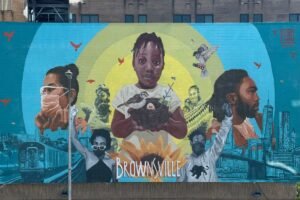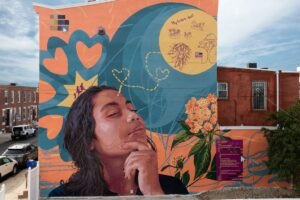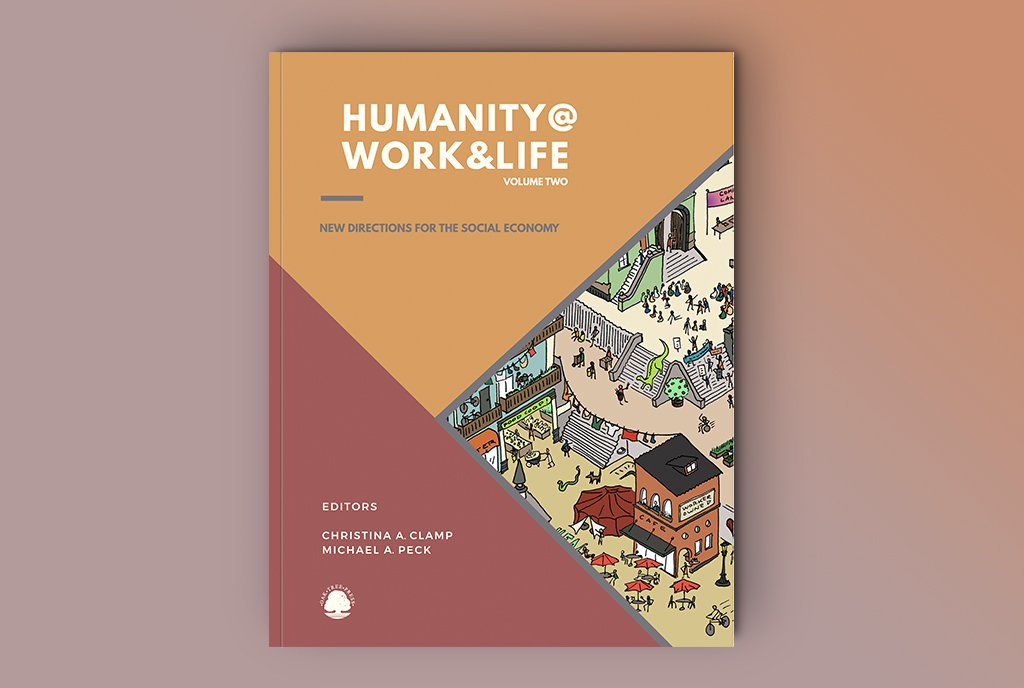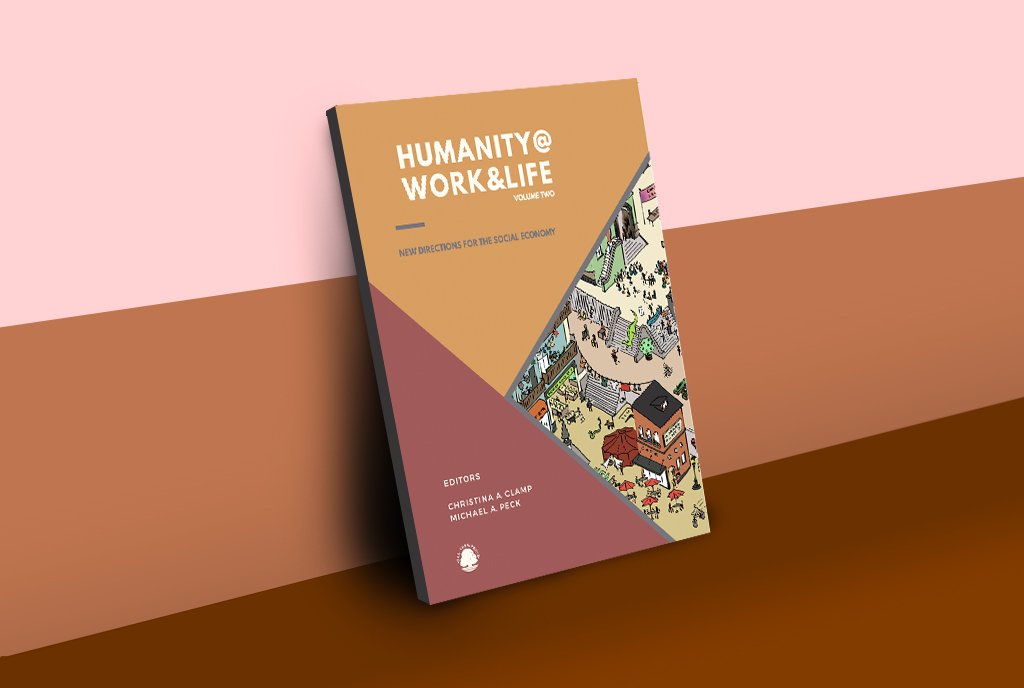
“You can’t hate someone who you know a lot about,” said keynote speaker Rachel Plattus, drawing on the words of Gladys Tantaquidgen, a famed Mohegan anthropologist. Plattus, in her address at the New Economy Summit in late January in Worcester, Massachusetts, made the case for relationship-building as a fundamental next step for social and economic justice activists.
The summit marked the event organizers’ second annual gathering. More than 100 people came to the event from throughout New England and the Mid-Atlantic region.
Two organizations were the lead conveners. One was Worcester Roots, a network of youth and adult organizers founded in 2001 with the mission of creating “opportunities for economic, social, and environmental justice” and which conducts an annual co-op academy to train co-op developers. The other, the Social Venture Collaborative, a group at Worcester State University that seeks to “promote and support social ventures in Central New England.”
Plattus, who kicked off the proceedings, is co-editor of Beautiful Solutions, which hosts a web platform “for sharing the stories, solutions and big ideas needed to build new institutional power and point the way toward a just, resilient, and democratic future.” The point of the project, in short, is to move beyond resistance to outlining what positive economic alternatives might look like, in part by lifting up scores of real-world examples.
In her talk, Plattus sought to highlight trust as a key building block in creating the foundations for a movement with a positive vision. She noted that with a number of communities under attack in the nation’s current political environment, building relationships is critical. As Plattus put it,
We have to figure out pretty quick how we can know each other. Other things happen too when we know about each other. We can grow to trust each other and practice making decisions together. We can map: figure out what we have and what we need. We can pool our resources. This kind of knowing each other…to meet our community’s needs together is what we are here to do today.
Relationships, Plattus added, “are the fundamental building blocks of a new economy” and “help us to distinguish between our understandings of the people and the system and then to change the system.” As for a definition of “resilience,” to Plattus, “it means people in relationships assessing their needs and meeting those needs in ingenious ways.”
Plattus acknowledged the inherent difficulties faced by social movement organizations—for instance, the need to balance planning and flexibility, staying attuned to what is emergent but still operating within a clear overall framework.
“We cannot plan for everything, but we need a plan,” Plattus said. “We have to listen, but we can’t wait for things to happen to us.”
The conference’s theme was “building a resilient social venture ecosystem.” And there were plenty of nuts-and-bolts sessions on topics such as cooperatives, community development finance, and renewable energy. For instance, one panel discussed the possibility of creating “social enterprise zones,” which would provide tax incentives to worker cooperatives and social enterprises. The effort, led by Peter Friedland at the Center for Social Innovation of Worcester State University, David Jordan of the Seven Hills Foundation, and Emily Kawano of the Wellspring Co-op, hopes to get legislation passed that would create three pilot districts in Massachusetts—most likely in midsized cities like Worcester, Springfield, and Lowell—that can test whether state support for community-based businesses leads to more sustainable local economic development.
Another panel looked at a range of community investing options. These ranged from Unibank—a local bank that developed an Invest Worcester Savings Account that serves as a specialized savings account in which deposited funds being are earmarked to make home, small business, and nonprofit community facility loans within the city of Worcester—to a range of community development financial institutions, including the Cooperative Fund of New England, which lends to existing cooperatives; the Boston Impact Initiative, which lends to businesses shortly past launch; and socially responsible business funds like Balanced Rock Investment Advisors.
The Worcester region is also home to many on-the-ground, community-owned business. For example, a reception after the conference was held at 3Cross Fermentation Cooperative, a Worcester-based craft brewery that had just recently converted to worker cooperative ownership. Overall, conference sponsor Worcester Roots estimates that to date, the co-ops it has helped incubate or convert to worker ownership have 25 worker-owners and 35 total employees.
The closing plenary returned, however, to many of the broader themes touched on in the conference’s opening keynote, with a focus on how to build movements for social and economic change. The three people who formed the panel in the closing plenary were Emily Kawano, Co-Director of Wellspring; Esteban Kelly, Executive Director of the US Federation of Worker Cooperatives; and Jonathan Rosenthal, Executive Director of the New Economy Coalition.
Kawano began the discussion by laying out five principles that for her define a solidarity economy—in addition to solidarity itself, these principles are participatory democracy, sustainability, equity, and pluralism. While the concept is not well known in US, the notion of a “social and solidarity” economy has motivated many activists across the globe, even guiding government policies in some countries. Kawano herself, in addition to her role as co-director of the Wellspring Co-op, also serves as coordinator of the US Solidarity Economics Network, as well as participating in an international social and solidarity economy network.
Esteban Kelly of the US Federation of Worker Cooperatives notes that his organization straddles the line between engaging in political activism while providing business services for members. We “mobilize our members through partnerships to advance and grow worker ownership and advocate for the model,” Kelly said. But the federation also supports the businesses through direct business service things. “We launched a vision plan on January 1st. We have had a dental plan for a year or so. We helped members in North Carolina get access to health care.”
Sign up for our free newsletters
Subscribe to NPQ's newsletters to have our top stories delivered directly to your inbox.
By signing up, you agree to our privacy policy and terms of use, and to receive messages from NPQ and our partners.
For his part, Jonathan Rosenthal has been at the New Economy Coalition for two-and-a-half years, but he has worked for the past 35 years in the fair-trade, worker co-op, and food justice movements. Back in the 1980s, he was one of three founders of Equal Exchange, a coffee roasting co-op that now has over 100 worker-owners and earned $60 million in revenue in 2014.
Rosenthal said he came to the New Economy Coalition because it stood at the intersection of “small is beautiful” and “systemic change.” The Coalition, noted Rosenthal, started about six years ago. Today, it has over 200 organizational members. The coalition seeks to support the development of an “economy that builds community wealth, planet well-being, restoration, and healing.”
A topic of discussion was the relationship between the nation’s current mixed capitalist system and the social structures that the panelists were seeking. For her part, Kawano, based on her past work at the University of Massachusetts, Amherst’s Center for Popular Economics. defined capitalism as involving five components: 1) private ownership, 2) wage labor, 3) production for profit, 4) commodity production and 5) ales in a market. According to Kawano, all five conditions must be met for an economic form to be capitalist. Kawano noted that worker cooperatives—like the Wellspring Co-op that she co-directs—are a non-capitalist form because the workers own the company, and therefore there’s no separation between workers and ownership.
“As a movement,” Kawano added, “a good part of the work is to lift up what already exists. Co-ops, lending circles, credit unions have been around forever” and, for Kawano, provide a building blocks for developing an entire economy based on values of solidarity.
A key item of debate concerns what is required to achieve an economy that reflects values of social justice, equity, and solidarity. For example, in NPQ, Elizabeth Castillo suggested that what is critical is not changing economic forms per se but rather establishing—or reestablishing—norms of reciprocal exchange, with “prosocial business” as part of the process. Kawano, by contrast, believes that “capitalism with a human face” is not possible and argues that a break with contemporary capitalism will ultimately be necessary, even if such a break may not be likely for some time yet.
For his part, Kelly said that he agrees “that fundamentally worker cooperatives are a post-capitalist business formation and one that stewards and begins to plant seeds for a new level of civic engagement where we can see democracy as something that happens inside of enterprises. And yet we fit pretty comfortably within capitalism.” Kelly observed that, “In movement spaces, we are the business people; in community development, we are the movement people.”
Kelly added, “Worker co-ops allow our members to survive and be resilient in the face of gentrification, homophobia, transphobia, patriarchy, sexual assault and harassment,” as well as build “capacity to be more adaptive to what is coming.”
For Rosenthal, what is core to capitalism is that “In our current society, we have put money and capital as the driver and saver in the center of what we worship.” The alternative, Rosenthal argued, “is about taking money out of the center and replacing money with Mother Earth.” Rosenthal added that, “Capitalism has pitted living things against one another—whether it is race, gender, class, or other living systems. This has put the survival of all species on the line.”
Rosenthal conceded that, “Replacing money with mother earth and love is perhaps an idealistic and naïve definition, but it works really well to me. How do we find concrete ways to do that transformative act in ways that are practical and effective?”
Among the concrete activities the coalition is working on, Rosenthal added, was having a working group look at how member-owners can reassert control over the nation’s 900 rural cooperatives. These co-ops provide power to 42 million people in 47 states, but most, according to Rosenthal, “are committed to coal, nukes, and uninformed members.” The Coalition, Rosenthal said, has “hired a cartographer using GIS mapping technology to identify the overlap of electric co-op members and organizers,” which hopefully will fuel internal democratization campaigns at some co-ops.
Developing a broader policy platform is another part of the Coalition’s work. The Coalition has recruited a set of fellows who form the New Economy Reporting Project (NERP). Fellows are paid a small stipend and produce pieces in their medium—be that video, podcast, or written form—about what is happening in the new economy. The goal, Rosenthal said, is to make worker cooperatives and other forms of community ownership “more real to people and drive discussion to the mainstream.”
Rosenthal pointed out that while worker co-ops have gained in prominence, they are still not a major part of the national dialogue. Pointing to polls that indicate that a majority of Americans under the age of 30 have a negative opinion of capitalism, however, Rosenthal noted that “there is a gap there” and an opportunity “to raise ideas to the national level.”
The road to social and economic justice is unlikely to be smooth, Kelly observed. “If we are dealing with the most complex planet-spanning system we have ever seen, you are going to have to tussle with it. We talk to senators. It is a theory of change. That is how we get to post-capitalism.”
Kelly also suggested that a lot of work could be done not just on Capitol Hill, but at the grassroots. “Staying informed, we lift one another up,” Kelly said. “You have real stories and anecdotes that you can forward. As opportunities pop up, you’re there at the ready.”











